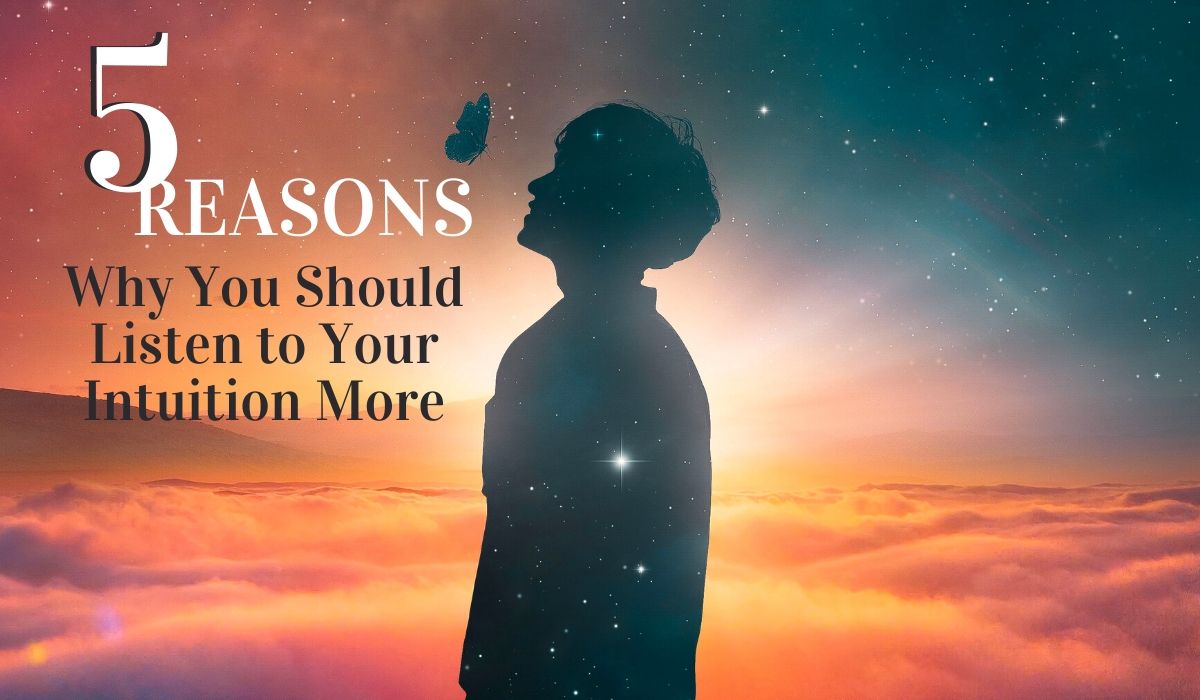Have you ever thought that you should have listened to your intuition? There are several reasons why you should listen to your intuition more often.
Don’t try to comprehend with your mind. Your minds are very limited. Use your intuition.
~ M. L’Engle (a wind in the door)
Instinct, gut feeling, intuition, inkling, sixth sense, whatever you call it, intuition is the mysterious force of our lives that guides, protects and informs us with an insight that is usually not available or readily present in the conscious mind.
We all have a certain degree of intuition; from the most cynical to the most naive among us. As Einstein said about intuition: “Sometimes I feel like I’m right. I don’t know that I am.”
And this is precisely what intuition is at the base: a sudden and inexplicable feeling that arises in us, a feeling that tells us to seize this opportunity, to follow this path, to accept this opportunity, to open this door. Intuition also tells us what not to do, what to be careful, when to be alert, and when to stop. As novelist Dean Koontz beautifully put it: “Intuition is seeing with the soul.”
The soundless voice:
Derived from the Latin word “intueri” which means “to look, to consider”, intuition is associated with the right side of the brain. As you may or may not know, the right side of the brain is responsible for creativity, imagination, musical and artistic skills, and emotions, as opposed to the left side of the brain which is related to logic, reasoning, and critical thinking.
So intuition flows from this non-linear dimension of our mind, that part where unconscious connections and associations are established and arise in our conscious minds seemingly out of nowhere.
As Joseph Murphy, author of The Power of Your Unconscious Mind notes: “In your subconscious depths there is infinite wisdom, infinite power and an infinite supply of all that is necessary, which awaits development and expression.” So intuition is an incredibly powerful tool, a gift ready and available to us, but often overlooked or forgotten.
When life whispers, listen carefully:
Throughout history, people have listened carefully to the whispers of life. From Dr. Loewi’s intuitive discovery of the chemical transmission of nerve impulses and the invention of the sewing machine by Elias Howe to the theory of gravity of Isaac Newton, many important advances in all areas of existence have been attributed to spontaneous sparks of intuition.
But why should we pay attention to our gut feelings? I mean, it’s not like we’re planning on becoming world-class physicists or inventors, is it? False. You don’t need to strive either. Here are some reasons why you should listen to your intuition:

Recommended: This Is How Our Ego, Intuition, and Spirit Guides Communicate with Us
1. It reveals our deepest truths:
Whether it is about ourselves, about others, or about life in general, intuition helps us develop deeper understandings, which help to direct our thoughts, feelings, and decisions.
2. It helps us identify the bad omens:
Failure, financial collapse, death, emotional threat – intuition puts us in touch with our instinctual defense systems, helping us avoid damage.
3. It opens us new paths:
By also helping us identify the positive signs in our lives, intuition opens new doors for us when we least expect it.
4. It guides and helps us make clever decisions:
By allowing us to know what decisions to make and when, intuition helps us achieve confidence and peace of mind, helping us to follow paths that are true to us; paths with heart.
5. It helps us live fulfilling lives:
The truth hurts, but the truth also helps us wake up from the false, corrupt, and delusional lives we sometimes lead, and the choices we make from time to time. Intuition brings truth, and therefore brings change and transformation. When we listen to it, we make decisions that ultimately help our lives to be authentic and fulfilling.
Recommended: The 4 Levels of Intuition, Where do You Find Yourself
The soul’s GPS:
So how can we listen to our intuition in order to lead a happier and fuller life? I have asked the same question several times. Here is what I learned:
1. Learn to trust your intuition by listening without judgment.
Most of us, including myself, have a terribly strong critic in us who likes to analyze everything and dissect everything to death. Listening to your intuition is not just about paying attention to it, it’s also about allowing it to say what it needs to do without us undermining it. The more we get into the habit of listening without judging, the easier it will be to take seriously what our instincts are trying to tell us.
2. Be judicious.
I have often confused fearful and paranoid thinking with calm and neutral intuitive thinking, which can be very detrimental. You must learn to distinguish fear from intuition by remembering that intuition is peaceful, centered, unemotional and detached. Feelings of fear, on the other hand, are emotionally charged, chaotic and vague.
3. Learn to become more aware of yourself.
Self-awareness is the ability to be aware of your feelings, thoughts and behaviors and how they impact you and the people around you. The more we are aware of what is going on inside of us, the easier it will be to identify our small still voices in the first place. Mindfulness, meditation and introspection all help develop self-awareness.







